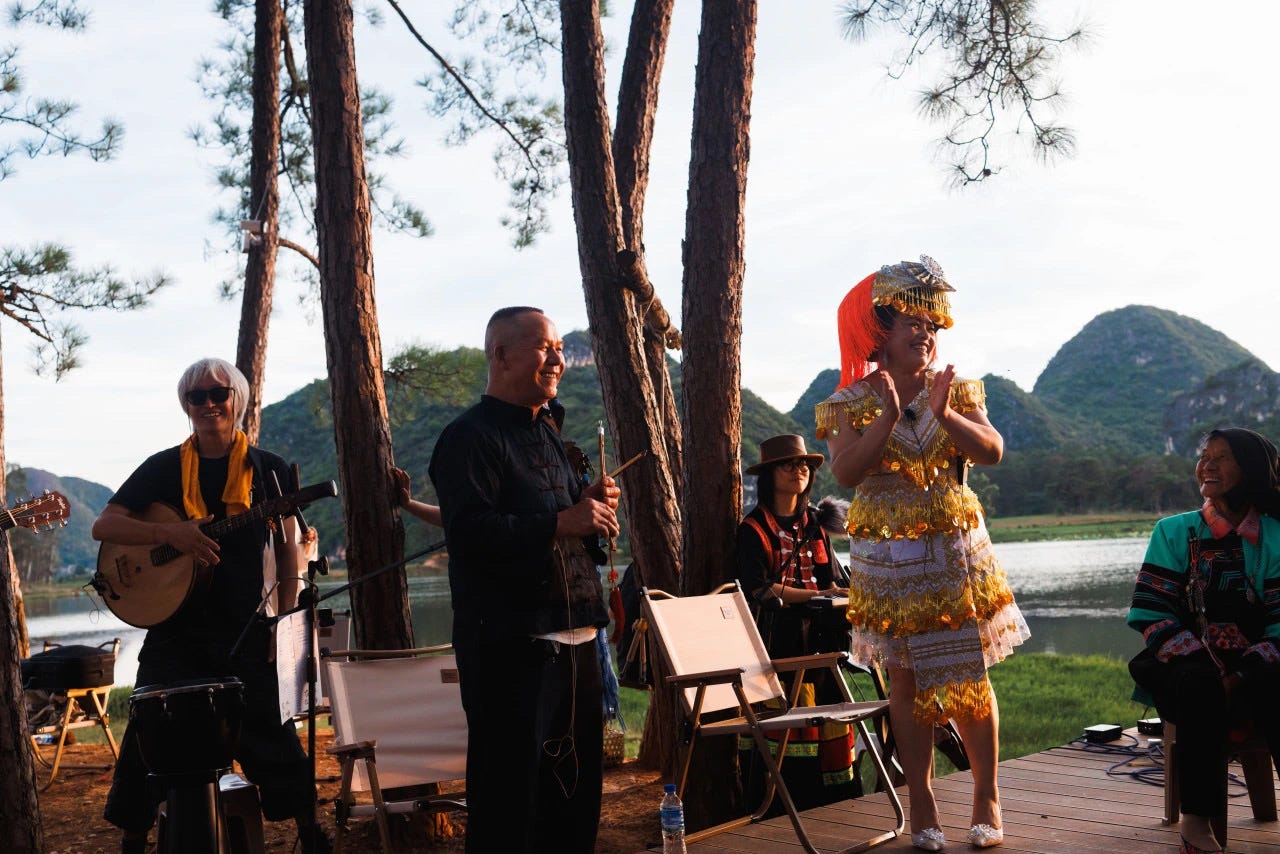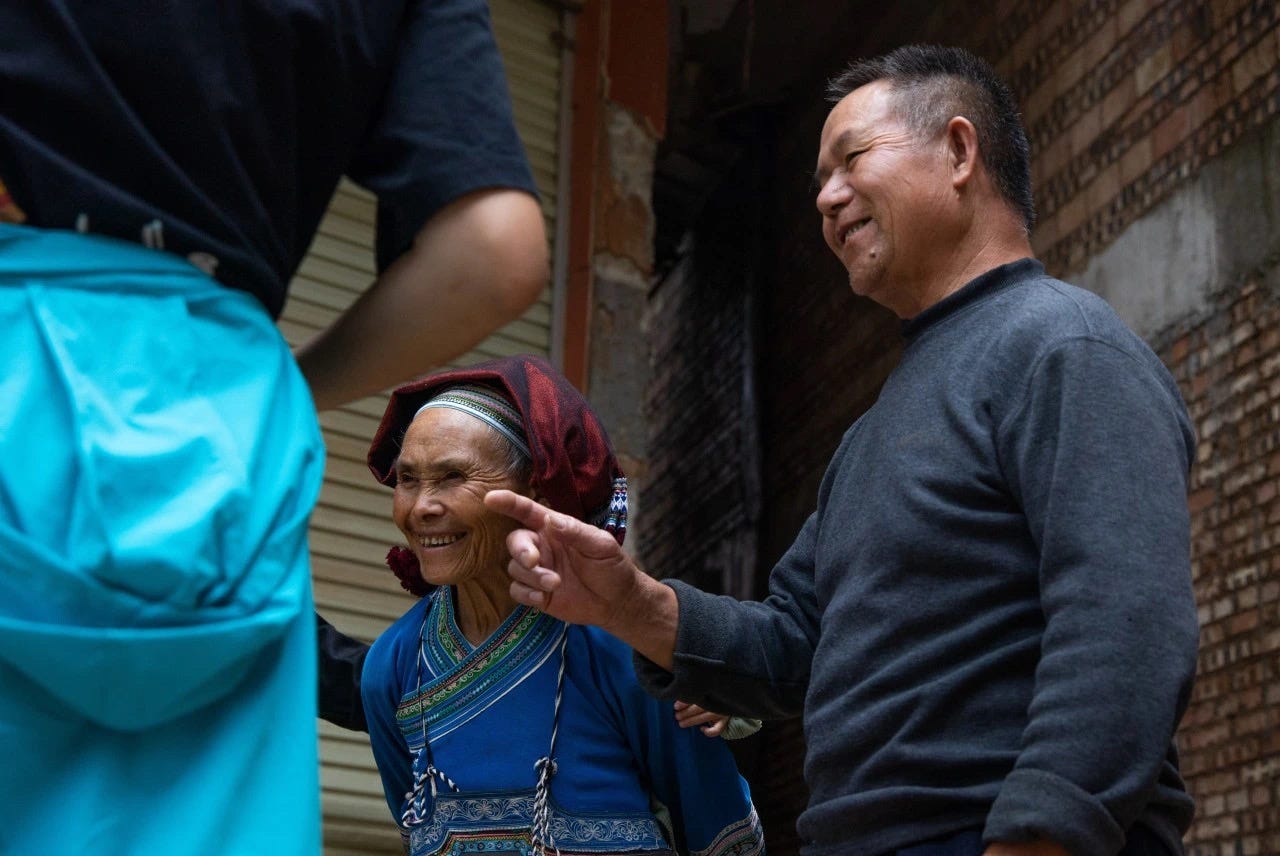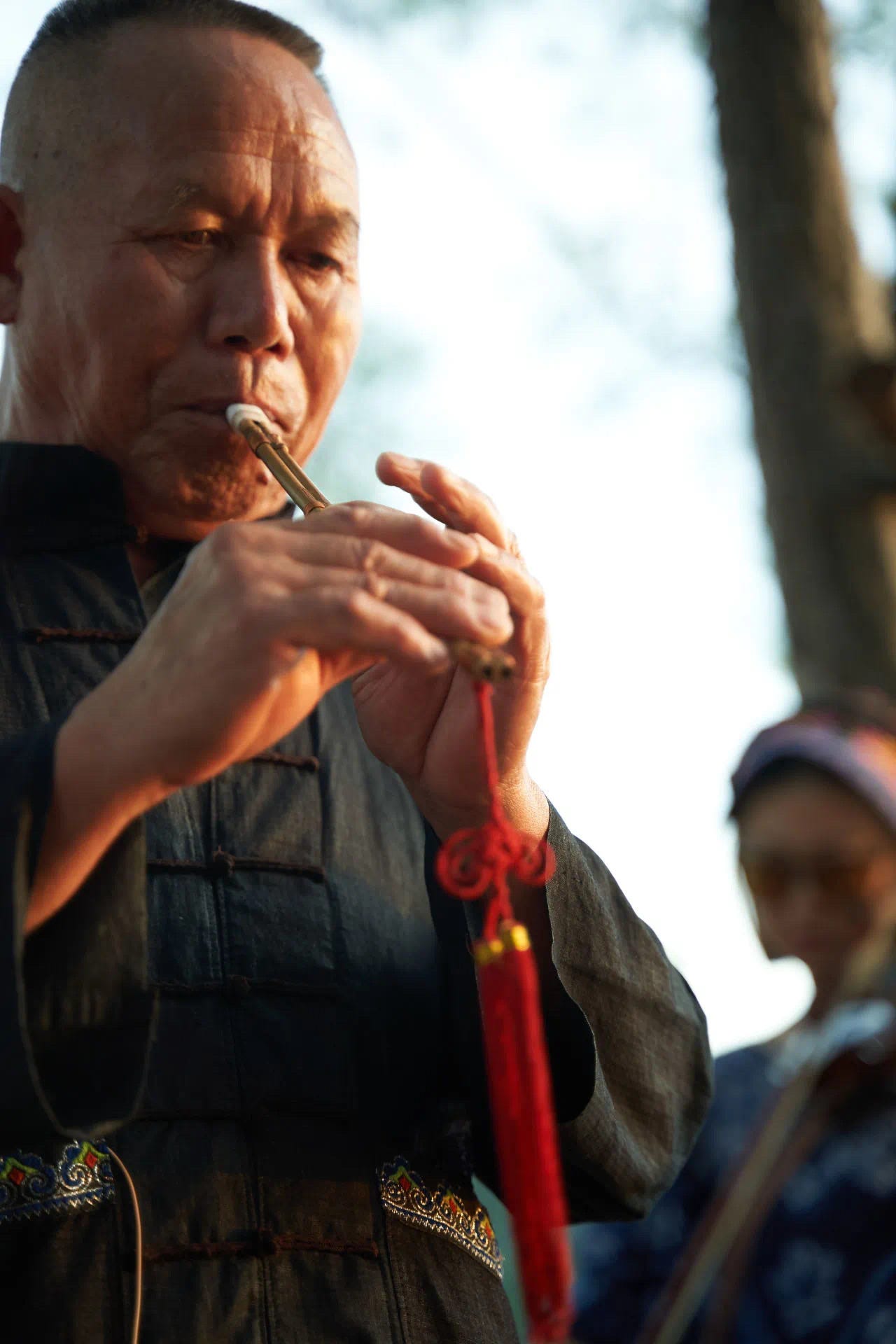Shaogang He (何绍刚) is 67 years old. He belongs to the Zhuang tribe, Black Sha sect (壮族黑沙支). He plays the Bawu (巴乌), a wind instrument traditional to multiple ethnic tribes in southeastern China.
The following interview was conducted and transcribed by Yiqing Wang, Yufei Xiao, Shiyu Hu, Xiaohe, Sanyang, Zixian Yang, Xin Wang as part of the 寻谣计划 Lullaby Search project.

Family
Shaogang He was born in 1956 in Pingzhai stockade (平寨乡), a big village in the Qiubei county of Wenshan autonomous prefecture of Zhuang and Miao tribes (文山壮族苗族自治州) in Yunnan province.
He went to school from 7 to 19 years old — Elementary school, middle school, and two years of farming school. Because his family was classified as “upper middle farmer” 中上农1, after graduating he could only go home to farm. When he was around 30 years old, he took over his parents’ restaurant in Pingzhai stockade.
When he was 22 years old, he met his wife during a village market2. There are many men and women at the market. If they found each other fitting, they would sit on the river levees together. However, it was not until He was 32 that the two were married. During these 10 years, they rarely meet. Usually the woman cannot live in the man’s home. These were the older marriage traditions in Zhuang tribe, specifically the Black Sha sect, as the other Sha sects and other Zhuang sects have different traditions.
He has 3 children who are now around 27 to 30 years old. Back in the day, the third child is counted as extra birth3. Hence shortly before the child was born, the mom went into the mountain to live for a period to not be spotted by neighbors and the town birth control committee. After the third child was born, they still had to pay 10,000 RMB as the extra birth penalty.
Of the 3 children, one now still lives in Qiubei county, two now work as migrant worker4 in Guangzhou, Guangdong. He has 5 grandchildren. All the grandchildren live with their parents, so He doesn’t need to help out with taking care of grandchildren. He and his wife split their work equally in farming and running the restaurant.
When do people play Bawu
When I first heard Shaogang He play the Bawu, I cried.
My teammate Sanyang and Hu Shiyu later told me they also almost cried. Sanyang shared that night when we gathered with the entire project group: “When the Bawu starts, it is primal. You can only cry. Everyone will die, disappearing is no big deal. That moment you are pierced. When you recall it later, it can help you cross the bridge. Feeling touched like this everyday makes this work worth enough for me.”
An 82 year-old woman we met on the street came to listen to Bawu with us. When I told her I cried she laughed at me: “Bawu doesn’t make tears, it makes laughter. It’s about dating!5”
“Bawu is actually an instrument to attract the opposite sex.” Said He.
Back in the day Zhuang tribe were poor. In the night there is no electricity or lamp, only 明子 (the inflammable core of pine wood). The only entertainment activity everyone can do is to come out at night to play the Bawu. When the girls hear the boys play bawu, they get out of their house to the river bed to sing love songs.
Many people learned the Bawu to find a wife. He has dated someone by playing the Bawu, but his current wife wasn’t found through Bawu.
How did he learn the Bawu
When He was 16, he started learning the Bawu. He followed Wang Yunxiang as his teacher for a year. The main practice was cyclical breathing 循环呼吸法. He spent a few months to acquire the skill. He practiced by blowing into a bowl of water through a reed stalk. At first He didn’t have his own Bawu, so he had to borrow his teacher’s. After he has learned how to play it, his teacher gifted him one.
Now In Pingzhai Stockade there are only 4 people who can play the Bawu. Young people don’t want to learn it anymore. He has no students. Bawu might 失传 (become no longer passed down).
According to his memory, Bawu learning and playing was not affected during the cultural revolution, when he was about 10 years old.
The origin story of Bawu
He Shaogang formed a Zhuang Tribe Dongjing 洞经 band. One of the bandmembers, Zhang Bingguang, told the following story about how Bawu was invented in Zhuang language. Zhang Yunguang and Zhang Guofen then retold the story into Mandarin:
Once upon a time, there was a boy whose parents left. He lived with his uncle’s family and herded cattles for them. One day his cattle was naughty and ate the rice shoots in a neighbor’s paddies. The neighbor ran after the boy to beat him. The boy escapes into the mountain, and accidentally fall into a big hole. He stayed in that hole for 10 years. He ate all the grass in the hole and was starving. Then a reed from the river fell into the hole. When he blew on the reed, all the birds of the woods came to listen. The birds all sat on the tree branches above the hole. There were so many birds that the branch bent down. The boy hurriedly held onto the branch. When the birds flied away, the branch catapulted him out of the hole. He returned to his uncle’s home. (There was more to the story, but the translation stopped here.)
How to make a Bawu
The traditional Bawu comprises of a pair of insect pupa (the mouthpiece), a pair of bamboo stanza (the sounding tube), and copper wires. The pupa inserts into the bamboo stanza, which is tied together by the copper wire. No glue is required.
The insect pupa grows naturally as a pair, not stuck together by humans. The pupa grow on leaves of a bush. The bush is called Guzhi in Zhuang language (this is our Mandarin transliteration, not the Zhuang language spelling). It has green fruits and black seeds. The leaves are the size of thumbs. We are not sure what the Mandarin or Latin name for this bush is.
People used to be able to collect them from rivers near PingZhai. But there are less and less recently. The nearest ones might be all the way down in QingShuiJiang and more south.

To listen to the concert and read more about the lullaby-search project, check out their Wechat blog.
the cultural revolution, which started in 1966, mostly peaked in 1968, then tail events lasted until 1976. 出身 (chushen) refers to whether a person’s family belongs to “red” or “black” class. He graduated in 1975.
赶街 (ganjie) is a dialectical term for temporary markets in Yunnan and Guizhou areas. On specific dates such as weekend, Nth day of the lunar calendar month or year, there would be a big temporary market on the streets of a village. People from neighboring villages would all gather at the market to sell and buy things.
超生 (chaosheng) means to exceed the threshold of the birth control policy. The birth control policy was implemented in 1980. Although it is primarily known as the one-child policy, the limit is 2 children for minority ethnicities.
打工 (dagong) means being a migrant worker, mostly in factory or service sectors. Most are in coastal cities instead of in the mountains.
谈恋爱 (tanlianai) means dating; literally translates to talking romance.




